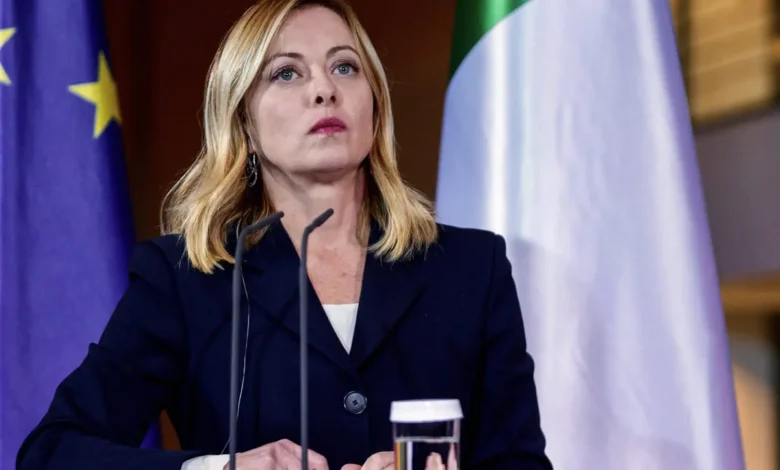Italian Prime Minister Giorgia Meloni: Leadership, Vision, and Influence

Introduction: Who is Giorgia Meloni?
Italian Prime Minister Giorgia Meloni , has become one of the most discussed figures in European politics. Rising to power in October 2022, she broke historical ground by becoming the first woman to ever hold the position of Prime Minister in Italy. Her journey to leadership is not only remarkable for its political significance but also for how it reflects the shifting tides of Italian and European society.
Born in Rome in 1977, Italian Prime Minister Giorgia Meloni path into politics was shaped by her upbringing, early activism, and resilience in an arena that often challenges women more intensely than men. Today, she represents a generation of leaders who are deeply rooted in national identity yet also face the task of navigating the global complexities of economics, migration, and international relations. Her political career offers an insightful look into Italy’s future direction, both domestically and abroad.
What makes Meloni particularly unique is her balance between tradition and modernity. She is outspoken, determined, and unafraid of controversy. While some celebrate her as a symbol of Italian pride, others view her policies with skepticism. Regardless of perspective, her influence cannot be ignored—she has become a central figure not only in Italy but across the entire European Union.
Giorgia Meloni’s Rise in Politics
Giorgia Meloni political journey began early. At just 15 years old, she joined the Italian Social Movement, a political party with roots in post-war conservatism. This early step revealed her determination and set the stage for a life dedicated to public service. Unlike many politicians who enter politics later in life, Italian Prime Minister Giorgia Meloni built her career step by step, learning the intricacies of Italian governance while holding fast to her values.
Her rise was not without challenges. Italy has long been dominated by male leaders, and the political arena has historically been harsh on women who aim for positions of power. Meloni, however, used these challenges as fuel. By the age of 31, she became Italy’s youngest-ever minister, serving as Minister of Youth in Silvio Berlusconi’s government. That role allowed her to solidify her presence in national politics and build credibility.
In 2012,Giorgia Meloni co-founded the political party Brothers of Italy (Fratelli d’Italia). Under her leadership, the party transitioned from a small nationalist movement into a dominant political force. Her ability to connect with citizens, particularly those who felt left behind by globalization and EU policies, allowed her to gain rapid popularity. By 2022, she had successfully positioned her party at the forefront of Italian politics, ultimately winning the general elections and assuming the role of Prime Minister.
Breaking Barriers: Italy’s First Female Prime Minister
One of the most historic aspects ofItalian Prime Minister Giorgia Meloni’s rise is her role as the first woman to serve as Prime Minister of Italy. For decades, Italy’s highest political office was seen as a male-dominated space, despite the country’s rich history of women playing influential roles in society, culture, and business. Giorgia Meloni shattered this glass ceiling, sending a powerful message about gender equality and representation in politics.
Italian Prime Minister Giorgia Meloni achievement has inspired countless women across Italy and beyond. It proved that perseverance and dedication can challenge even the most entrenched traditions. While some critics argue that her political ideology does not align with broader feminist movements, it is undeniable that her success has opened doors for women in politics. Representation matters, and Italian Prime Minister Giorgia Meloni presence in leadership has encouraged a new generation of women to pursue political careers.
Furthermore, her leadership style reflects both toughness and relatability. She often emphasizes her personal experiences as a working mother, something that resonates with many Italians who face the daily balance of work and family. This personal dimension adds depth to her political image and strengthens her connection with everyday citizens.
Policies and Vision for Italy
Giorgia Meloni’s policies are a mix of conservatism, nationalism, and pragmatism. She often emphasizes protecting Italy’s cultural identity, promoting family values, and strengthening the nation’s sovereignty. These stances resonate with a significant portion of Italians who feel that rapid globalization and EU regulations have weakened national independence.
Economically, her government faces the enormous challenge of stabilizing Italy’s fragile financial system. Italy has one of the highest levels of public debt in the European Union, and Italian Prime Minister Giorgia Meloni as made it clear that fiscal responsibility and job creation are top priorities. She advocates for lowering taxes on families and small businesses while ensuring Italy continues to benefit from European recovery funds.
On immigration, Meloni has adopted a firm stance. She believes in strict border control and has frequently highlighted the need for Europe-wide cooperation to manage migration flows. While her approach has been criticized as harsh, she argues that it is necessary for maintaining social balance and security. At the same time, her government has shown signs of pragmatism by working with European partners on solutions.
Italian Prime Minister Giorgia Meloni on the International Stage
Beyond domestic issues , Italian Prime Minister Giorgia Meloni has proven herself to be an active player on the global stage. As the leader of the third-largest economy in the Eurozone, her decisions carry significant weight in European and international affairs. She has consistently emphasized the importance of Italy’s place in NATO and the EU, even while promoting policies that prioritize national interests.
Her leadership has drawn attention from allies and critics alike. On one hand, she has strengthened Italy’s partnerships with countries such as the United States, underscoring her commitment to shared democratic values and security cooperation. On the other hand, her conservative positions have created some tension within the European Union, especially on issues like migration and budgetary rules.
Giorgia Meloni has also been vocal in supporting Ukraine amid the ongoing conflict with Russia. Her firm stance against Russian aggression has aligned Italy closely with EU and NATO allies, solidifying her role as a key European leader during a time of crisis. This demonstrates her ability to balance domestic political needs with the responsibilities of international leadership.
Public Perception and Criticism
As with any influential leader, Italian Prime Minister Giorgia Meloni’s career has been met with both praise and criticism. Supporters view her as a strong leader who speaks for ordinary Italians, someone who prioritizes family, culture, and sovereignty. They see her as a politician who is not afraid to challenge the establishment and fight for national interests.
Critics, however, raise concerns about her ideological roots, particularly her party’s historical ties to far-right movements. Some argue that her policies on immigration and social issues are too rigid, potentially undermining inclusivity and diversity. Others worry that her emphasis on nationalism could strain Italy’s relationship with the European Union in the long run.
Despite these critiques, Italian Prime Minister Giorgia Meloni remains a highly popular figure. Her ability to connect with citizens on an emotional level has given her a unique advantage in politics. Even when disagreements arise, many Italians respect her determination and authenticity, qualities often lacking in modern politics.
The Legacy Italian Prime Minister Giorgia Meloni is Building
While Italian Prime Minister Giorgia Meloni’s leadership is still in its early stages, her impact is already undeniable. She has reshaped Italian politics by bringing the Brothers of Italy from the margins to the center of power. More importantly, she has proven that persistence, vision, and courage can break barriers that once seemed unshakable.
Her legacy will likely be defined by how she navigates the challenges ahead: managing Italy’s economy, handling immigration, maintaining EU relations, and ensuring Italy’s voice remains strong on the international stage. Each of these areas will test her leadership and determine how future generations remember her.
What is certain, however, is that Italian Prime Minister Giorgia Meloni has already made history. She is not just a politician but a symbol of transformation in Italian politics. Whether one agrees with her policies or not, her role as Italy’s first female Prime Minister marks a turning point in the nation’s political story.
Conclusion: Italian Prime Minister Giorgia Meloni’s Place in History
Giorgia Meloni’s rise to the position of Prime Minister is both a personal triumph and a national milestone. She embodies resilience, ambition, and conviction. Her journey from a young activist to Italy’s top political leader reflects the dynamic changes happening in Italian society and politics.
As Prime Minister, she faces immense responsibility—not just to her party or her supporters, but to the entire country. Her leadership will shape Italy’s future and influence Europe’s direction. While her policies may remain a subject of debate, there is no doubt that she has already left an indelible mark on history.
In the end ,Italian Prime Minister Giorgia Meloni represents something much larger than politics—she symbolizes possibility. Her story reminds us that barriers can be broken, traditions can be challenged, and leadership can emerge from unexpected places. Whether celebrated or criticized, she stands as one of the most important political figures of her time, guiding Italy through a new chapter in its long and storied history.



